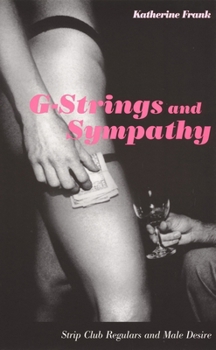G-Strings and Sympathy: Strip Club Regulars and Male Desire
Select Format
Select Condition 
Book Overview
Based on her experiences as a stripper in a city she calls Laurelton--a southeastern city renowned for its strip clubs--anthropologist Katherine Frank provides a fascinating insider's account of the personal and cultural fantasies motivating male heterosexual strip club "regulars." Given that all of the clubs where she worked prohibited physical contact between the exotic dancers and their customers, in G-Strings and Sympathy Frank asks what--if not sex or even touching--the repeat customers were purchasing from the clubs and from the dancers. She finds that the clubs provide an intermediate space--not work, not home--where men can enjoyably experience their bodies and selves through conversation, fantasy, and ritualized voyeurism. At the same time, she shows how the dynamics of male pleasure and privilege in strip clubs are intertwined with ideas about what it means to be a man in contemporary America. Frank's ethnography draws on her work as an exotic dancer in five clubs, as well as on her interviews with over thirty regular customers--middle-class men in their late-twenties to mid-fifties. Reflecting on the customers' dual desires for intimacy and visibility, she explores their paradoxical longings for "authentic" interactions with the dancers, the ways these aspirations are expressed within the highly controlled and regulated strip clubs, and how they relate to beliefs and fantasies about social class and gender. She considers how regular visits to strip clubs are not necessarily antithetical to marriage or long-term heterosexual relationships, but are based on particular beliefs about marriage and monogamy that make these clubs desirable venues. Looking at the relative "classiness" of the clubs where she worked--ranging from the city's most prestigious clubs to some of its dive bars--she reveals how the clubs are differentiated by reputations, dress codes, cover charges, locations, and clientele, and describes how these distinctions become meaningful and erotic for the customers. Interspersed throughout the book are three fictional interludes that provide an intimate look at Frank's experiences as a stripper--from the outfits to the gestures, conversations, management, coworkers, and, of course, the customers. Focusing on the experiences of the male clients, rather than those of the female sex workers, G-Strings and Sympathy provides a nuanced, lively, and tantalizing account of the stigmatized world of strip clubs.
Format:Paperback
Language:English
ISBN:0822329727
ISBN13:9780822329725
Release Date:December 2002
Publisher:Duke University Press
Length:368 Pages
Weight:1.31 lbs.
Dimensions:1.1" x 5.7" x 9.2"
Customer Reviews
3 ratings
Strip for me, Get a Ph.D...
Published by Thriftbooks.com User , 17 years ago
With the popularity of the exotic dancer/sex worker as Ph.D. candidate in anthropology and sociology, many dissertations have been published the past few years. Frank's is among the best -- while academic, it is also accessible to the lay reader, taking into its lens discussions of emotional labor, post-tourism, the male gaze, the psychology of the male customer and the inner motivations of dancers. Highly recommended for enjoyable ethnographic reading.
An acedemic book with the focus on the customer.....
Published by Thriftbooks.com User , 19 years ago
An interesting ethnography.....A good counter to all of the focus on strippers - why not study the customers for a change? I appreciated the fact that the author was not trying to be overly positive or negative about strip clubs or the men who go to them, but trying to understand why the customers were drawn to them in the first place. This isn't another "tell all" book about someone's experiences as a dancer, but still gives an insider's observations.
Understand the book for its actual theme
Published by Thriftbooks.com User , 21 years ago
While this is obviously adapted from academic material, Frank uses her experience as an exotic dancer to dig into the question of why men frequent strip clubs.I'll grant that, superficially, this is a darned easy question to answer.Still, one of the real strengths of the book is that Frank was able to see past her academic preconceptions and discover an emotional terrain that was not what she anticipated. The standard feminist analysis (male power and domination of women) didn't shed much light on male motivation. She considers a range of possible agendas, from the obvious to the esoteric, and never settles on a trite or doctrinaire analysis.The book keeps feeling like its on the verge of a profound insight but it never seems to find it. Frankly, even though the author wasn't trying to focus on the women who work as exotic dancers, it was fascinating to learn the tricks and scripts used to create the illusion of intimacy and authenticity.






